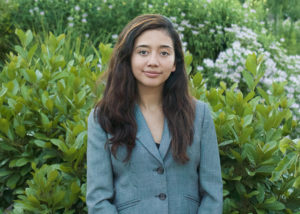Meet the New AHA Staff Member: Margie Delao

Welcome our new Social Justice and Policy Assistant, Margie Delao!
What is your educational and work background?
I studied political science and Hispanic studies at Washington College in Chestertown, Maryland. My undergraduate studies were primarily focused on human rights, reparations policy, and transitional democracies. During that time I worked in a legislative office at the Maryland House of Delegates, researching public accommodations discrimination in the state and the Affordable Care Act funding.
Following my undergraduate studies, I worked at Schreiber Translation Inc. as a project manager. I developed and executed complex translation, transcription, interpretation, and voiceover projects for an array of high-profile government and private sector clients. Additionally, I represented the company on Language Advocacy Day where world language educators and translation industry experts meet with members of Congress to advocate for increased funding for world language programs and the reclassification of interpreting services.
How did you first learn about humanism?
I learned about humanism from researching the American Humanist Association’s website. I was interested in working in policy and stumbled upon the AHA’s social justice work. I found that humanism resonated with aspects of my personal beliefs, which is what drew me to the organization.
Did you grow up in a traditional religious faith? How did it impact you?
I was raised Catholic. Both my parents are Catholic but they don’t attend church consistently enough for it to be a cornerstone of our family. Catholicism is heavily rooted in Hispanic culture and social structures. That said, while I have always understood Catholicism as a reflection of the community I come from, I’ve never felt an affinity for the theology or the ceremonial practices.
What interested you most about working for the American Humanist Association?
I knew that first and foremost I wanted to work in public policy and on progressive issues. I am excited to pursue my passion and work with an organization that champions secular government and civil rights. I am extremely grateful to be able to pursue the career path I envisioned for myself as a social justice advocate.
What book has influenced you the most?
My Antonia by Willa Cather was a book that really touched me when I first read it in ninth grade. Interestingly this book from the early 1900s was the first book I’d ever read on the hardships of the immigrant experience. The idyllic depictions of rural Nebraska resonate with me as it mirrors my fond memories of my childhood and from Honduras, where I was born.
If you could have dinner with any three people in the world (living or dead), who would they be and why?
The first person I’d invite is Rep. Alexandria Ocasio-Cortez (D-NY). As a young woman of color myself, I admire her tenacity and perseverance. She has strong convictions, and even though she angers many by being true to herself, she isn’t scared to be herself. Her passion and dedication to her predominantly working-class constituency of color is inspiring. Second, I’d invite my grandmother who passed away a couple of years ago. She grew up in rural Honduras and never learned how to read. She never talked about her life much and I regret never having asked. The third person at dinner would be Charles Dickens. At a satirical author and a champion of the working class, I would love to get his perspective of the world as we know it today.
